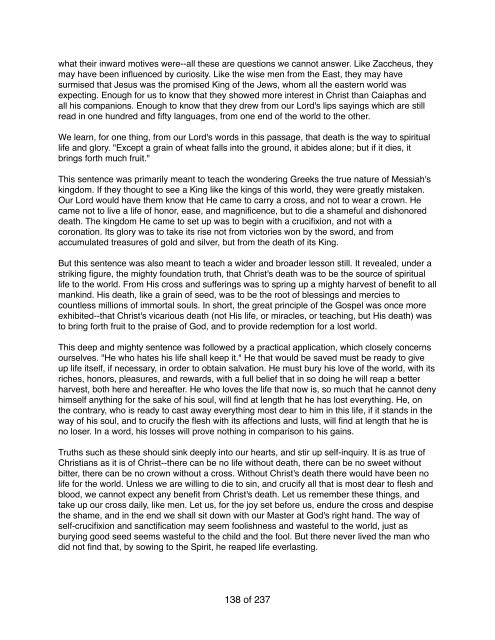J. C. Ryle John
John Charles Ryle (May 10, 1816 - June 10, 1900) was an evangelical Anglican clergyman and first Bishop of Liverpool. He was renowned for his powerful preaching and extensive tracts.
John Charles Ryle (May 10, 1816 - June 10, 1900) was an evangelical Anglican clergyman and first Bishop of Liverpool. He was renowned for his powerful preaching and extensive tracts.
Create successful ePaper yourself
Turn your PDF publications into a flip-book with our unique Google optimized e-Paper software.
what their inward motives were--all these are questions we cannot answer. Like Zaccheus, they<br />
may have been influenced by curiosity. Like the wise men from the East, they may have<br />
surmised that Jesus was the promised King of the Jews, whom all the eastern world was<br />
expecting. Enough for us to know that they showed more interest in Christ than Caiaphas and<br />
all his companions. Enough to know that they drew from our Lord's lips sayings which are still<br />
read in one hundred and fifty languages, from one end of the world to the other.<br />
We learn, for one thing, from our Lord's words in this passage, that death is the way to spiritual<br />
life and glory. "Except a grain of wheat falls into the ground, it abides alone; but if it dies, it<br />
brings forth much fruit."<br />
This sentence was primarily meant to teach the wondering Greeks the true nature of Messiah's<br />
kingdom. If they thought to see a King like the kings of this world, they were greatly mistaken.<br />
Our Lord would have them know that He came to carry a cross, and not to wear a crown. He<br />
came not to live a life of honor, ease, and magnificence, but to die a shameful and dishonored<br />
death. The kingdom He came to set up was to begin with a crucifixion, and not with a<br />
coronation. Its glory was to take its rise not from victories won by the sword, and from<br />
accumulated treasures of gold and silver, but from the death of its King.<br />
But this sentence was also meant to teach a wider and broader lesson still. It revealed, under a<br />
striking figure, the mighty foundation truth, that Christ's death was to be the source of spiritual<br />
life to the world. From His cross and sufferings was to spring up a mighty harvest of benefit to all<br />
mankind. His death, like a grain of seed, was to be the root of blessings and mercies to<br />
countless millions of immortal souls. In short, the great principle of the Gospel was once more<br />
exhibited--that Christ's vicarious death (not His life, or miracles, or teaching, but His death) was<br />
to bring forth fruit to the praise of God, and to provide redemption for a lost world.<br />
This deep and mighty sentence was followed by a practical application, which closely concerns<br />
ourselves. "He who hates his life shall keep it." He that would be saved must be ready to give<br />
up life itself, if necessary, in order to obtain salvation. He must bury his love of the world, with its<br />
riches, honors, pleasures, and rewards, with a full belief that in so doing he will reap a better<br />
harvest, both here and hereafter. He who loves the life that now is, so much that he cannot deny<br />
himself anything for the sake of his soul, will find at length that he has lost everything. He, on<br />
the contrary, who is ready to cast away everything most dear to him in this life, if it stands in the<br />
way of his soul, and to crucify the flesh with its affections and lusts, will find at length that he is<br />
no loser. In a word, his losses will prove nothing in comparison to his gains.<br />
Truths such as these should sink deeply into our hearts, and stir up self-inquiry. It is as true of<br />
Christians as it is of Christ--there can be no life without death, there can be no sweet without<br />
bitter, there can be no crown without a cross. Without Christ's death there would have been no<br />
life for the world. Unless we are willing to die to sin, and crucify all that is most dear to flesh and<br />
blood, we cannot expect any benefit from Christ's death. Let us remember these things, and<br />
take up our cross daily, like men. Let us, for the joy set before us, endure the cross and despise<br />
the shame, and in the end we shall sit down with our Master at God's right hand. The way of<br />
self-crucifixion and sanctification may seem foolishness and wasteful to the world, just as<br />
burying good seed seems wasteful to the child and the fool. But there never lived the man who<br />
did not find that, by sowing to the Spirit, he reaped life everlasting.<br />
138 of 237




